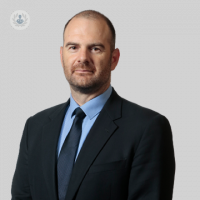Obesity: how can it be managed?
Escrito por:Obesity is a condition which can seriously hinder someone’s life, impacting their health both physically and psychologically. Weight loss can transform the life of someone suffering from obesity, improving both their health and confidence. Award-winning specialist in metabolic medicine Professor Carel Le Roux provides us with tips to effectively manage substantial weight loss.

How can people suffering from obesity effectively achieve substantial weight loss?
When considering effective treatment for obesity, we measure this in how much people reduce the amount of food that they eat and ultimately how much weight they lose. People can only achieve substantial weight loss and maintain this weight loss in the long term if obesity is treated as a complex and chronic disease. This moves a little away from weight loss and into health gain. We only achieve this health gain if we can treat the disease in the long term, in an effective way, whether it be through nutritional therapies, pharmacotherapies or surgical therapies.
How can people maintain their substantial weight loss?
Weight loss can only be maintained if the disease remains in remission; if we start an effective nutritional therapy and it works by making people feel less hungry and they're able to lose the weight. However, if we stop the nutritional therapy, patients will become hungry again because the disease is relapsing, and we ultimately see them regaining the weight that was lost.
The same can be said for medication; if the medications are effective, they must be continued in the long term. Surgery is the most effective treatment we have, but it's a perfect chronic treatment because although we only do one operation, it continues to work every time you have a meal. Therefore, we would consider all three of these treatment options as effective, but they only work if we continue them in the long term.
Is diet the most important element of weight loss?
There's not one treatment that is more important than another. The majority of people believe that they have to start with a diet or nutritional therapy, which is a perfectly good place to start. However, many patients have had multiple diets or nutritional therapies in the past and therefore many wish to move straight on to have pharmacotherapy or straight on to have surgical therapy, which is perfectly possible and should be allowed.
What advice would you give someone looking to lose weight?
If you want to lose weight because you have a social desire for thinness; if you just want to lose weight because you want to look different when you see yourself in the mirror, unfortunately, we do not have very effective treatments to achieve this. On the other hand, if you want to lose weight for the purposes of health gain, there are various different options available.
With regards to treatments offered, there is more of a focus of shifting the focus away from weight loss to health gain, and then we have to determine what are the major health gains that you wish to focus on. Some of these include functional gain; wanting to go out with family and friends and engaging in society.
For others, they may wish to improve their metabolic health. For example, some may wish to put their diabetes in remission or to prevent themselves from developing diabetes, heart attacks or cancer again, which can be achieved with substantial treatments for obesity.
What surgical and non-surgical treatment options are available?
Treatment options available include nutritional therapies, pharmacotherapies and surgical therapies within the nutritional therapy space. We can use any diet that may work and we have flexibility; we do not think that there is one diet that's going to work for everybody and we have to work with the individual to get the best diet for them.
During your consultation, your surgeon can discuss the various treatment options available, including the advantages, as well as the side effects, in order to help you make this decision. When it comes to surgical therapies, a sleep gastrectomy or a gastric bypass are two extremely popular and effective treatment options.
If you need advice about weight loss and would like to book a consultation with Professor Le Roux, simply visit his Top Doctors profile today.


